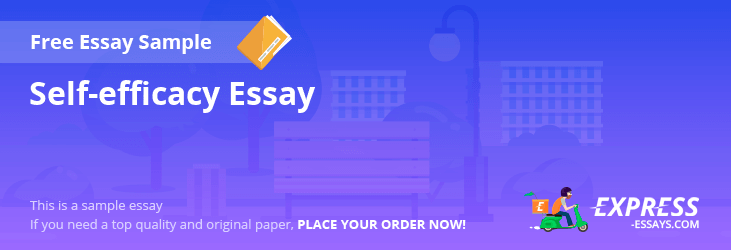Self-efficacy Essay
For the first time the concept of self-efficacy appeared in Albert Bandura’s social cognitive theory. Since then, this issue has become one of the most analyzed ones in psychology because it influences every aspect of human live. Self-efficacy is defined as a person’s conviction that they are able to execute a task and cope with various situations. This conviction determines one’s thoughts, feelings, and behavior. Self-efficacy beliefs also have an impact on the choices that people make, the effort they expand, and their persistence in overcoming obstacles. This paper analyzes the concept of self-efficacy and its impact on the students’ learning motivation and academic achievements.
It is essential to distinguish high and low self-efficacy. People with high self-efficacy face difficult tasks as challenges and do not try to avoid them (Zulkosky, 2009, p. 94). Similarly, students who have a high self-efficacy show excellent results in learning. They show more persistence while dealing with particular activities or tasks and can effectively manage such psychological problems as stress, anxiety and depression. Such students also have positive thinking skills that are necessary when facing some challenges. Being confident about their academic capabilities, they perceive solving hard tasks as an opportunity to gain new experience.
Calculate the cost of essay
Compared to high self-efficacy, low sense of self-efficacy is associated with stress, depression, anxiety, and helplessness (Zulkosky, 2009, p. 94). Students who have a low self-efficacy generally doubt in their own capability to solve difficult tasks and, as a result, prefer avoiding them at all. Their pessimistic attitude towards obstacles is the reason why they do not reach their goals. Fear of failure and negative outcomes restricts their learning abilities. Students envision low marks even before they begin to perform a task. Thus, low self-efficacy affects learning to a great extent.
As for my personal experience, self-efficacy plays an essential role in my educational background. My academic self-efficacy beliefs have a powerful effect on goal setting and task execution. I am not afraid of solving difficult tasks, as I have strong conviction in my capacity to show good results. Self-efficacy also influences my choice of school-related activities, level of effort, and emotional response. I normally put a persistent effort to achieving academic goals.
Limited Time OFFER!
Get 19% OFF
with code:
Self-efficacy is also an important factor for young learners with special needs. The higher their level of self-efficacy, the better they adapt to the school community, and the more positive emotions they receive. In contrast, low self-efficacy can lead to depression, and depression can reduce self-efficacy (D. Schultz, & S. Schultz 2005, p. 427). It causes behavioral and sensory integration problems in students. Teaching such kind of children should be directed at increasing their personal level of self-efficacy. The tasks for young learners with special needs have to be challenging and interesting enough; however, if the task is very difficult, it provokes their frustration.
There are some strategies that help to promote a positive self-efficacy for young learners. It is important for children to understand that their feeling of failure and success depends on internal, stable factors, but not external factors. Such approach gives them a sense of mastery and intensifies their self-efficacy. Observing someone who, in the same conditions as them, successfully achieves goals inspires children to work hard for showing good results in a similar situation. This is especially true if the observers think that the model has the same abilities (Zulkosky, 2009, p. 97).
Benefit from Our Service: Save 25% Along with the first order offer - 15% discount, you save extra 10% since we provide 300 words/page instead of 275 words/page
Young learners’ beliefs about one’s capacity depend on teachers’, parents’, and friends’ opinion. Support and encouragement makes children deal with difficulties and proceed to the more advanced levels of studying. Another significant strategy is providing children with positive emotions and mood, which also helps them to overcome obstacles. It helps young learners succeed in performing any task.
Notably, self-efficacy is linked with self-regulation, which can also impact the academic learning outcomes. Students who have a trong sense of self-efficacy and use effective self-regulation strategies have a good academic achievement. In this case, self-efficacy helps to promote the use of self-regulation strategies. Self-regulation implies a learning process that consists of proper type of behavior for one’s learning. Thus, increasing the self-regulation capacity, students increase their self-efficacy level, and vice versa, self-efficacy beliefs help students succeed in self-regulation.
VIP Services
$2.00Extended revision period
$3.00SMS notification of the order status
$3.66Get order proofread by editor
$4.40Get order prepared by top 30 writers
$5.99Get a full PDF plagiarism report
$9.99Get VIP support
20% OFFVIP services package $23.23
In conclusion, self-efficacy has a profound impact on academic learning. Self-efficacy refers to the students’ belief that they are capable to execute a certain task. Students with high self-efficacy show better results in academic performance than students with a low one. Self-efficacy is also important in the studying of children with special needs: for a successful adaptation in school community, they should have a high level of self-efficacy. Proper self-regulation strategies can promote a positive self-efficacy. High level of self-efficacy combined with effective self-regulation can faciliate excellent results in students’ academic learning.



